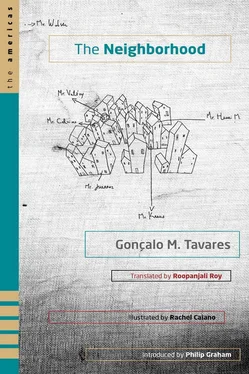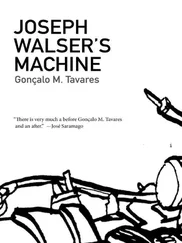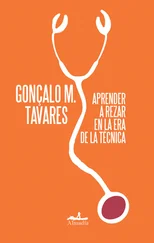An Afternoon in the Life of the Boss

1
The Boss was in his office calmly walking from one side to the other at a great pace around his table, entertaining himself by once in a while violently yanking out a hair from his scalp while he simultaneously controlled his bellow of pain, in a kind of game with himself, which he himself classified as “almost fun,” when, suddenly, a great deal of confusion broke out, there down below.
For the Boss, in fact, all his vexations inevitably came from “there down below”; it was almost a decree-law.
“I have to eliminate the part down below from the building,” thought the Boss, “there’s just no other solution.”
In fact, horrible shouts were emanating from the habitual source. And they were getting closer.
The Boss squared his shoulders, waiting.
“When danger approaches, commanders face it with squared shoulders and a head held high,” thought the Boss. But he immediately bent down to pick up a small coin that had fallen out of his pocket.
He once again squared his shoulders, standing ramrod straight, stiff, with his head held high, as though there was no other coin in the world on the floor. Completely vertical, this was a Man.
Meanwhile, the shouts began to take shape.
They then acquired the worst shape of all: they were the voices of his Assistants. They never left him alone.
The Boss was tired of despairing with the help of those men. He had the right to despair alone, like a real Boss. But there they were again, his Assistants.
2
He locked the door from inside. Later, he could always say that he had been in an important meeting.
If he was the Boss, and hence the apex of authority, wasn’t it important to think by himself for himself?
In fact, he could manage to have by far the most important meeting of all on his own.
In order to sound more convincing, when he would justify the locked door, he began to talk to himself, as though he were arguing with one of his earlier thoughts.
As he was not used to not agreeing with himself, the first words that he uttered were, “Bravo! An excellent idea!”
3
By now the assistants were quite close.
They ran about shouting, frightened.
Something serious had happened.
The Boss stood straight, raised his arm and pointed heaven-ward with his forefinger.
He liked this gesture; he felt as though he were showing the people the path to follow.
Except that there was nothing above his office. Only empty halls. And some toilets.
“Upstairs, you need to go upstairs,” the Boss seemed to say, with that gesture involving a raised arm and his forefinger stretching skyward.
And since he had been unable to get the people out of his head in the past few minutes, he felt moved and amazed with himself.
He, who before becoming the Boss had never, but never ever, thought of the people, was now completely immersed in thoughts about them, about the people (whom he had never met).
“This can be learned,” he murmured. Like a new high-jumping technique; it can be learned.
But they were already there, on the other side of the door, knocking on the door leading to his office.
“The Economists!”
“The Economists are on their way!!” yelled the Assistants, anxiously, from the other side of the door.
4
“What’s the hubbub all about?” asked the Boss. “I was despairing, but calm. What have you now come here to …”
“The economists say that it’s necessary to reduce expenses even more!” said the Assistants in unison, breathlessly.
“What expenses?”
“Other people’s expenses!”
“Ah, other people’s expenses!” exclaimed the Boss, relieved.
“Yes, Boss, but we can’t let our guard down. Because when the economists” (and this word was uttered as though the thought of repeating it out loud sent shivers down their spine) “say that it is imperative to cut other people’s expenses they keep looking at us. Staring, in fact.”
“At us?!” exclaimed the Boss, indignantly. “But we aren’t other people!”
Suddenly everyone fell silent, all at the same time, almost as though it had been planned beforehand.
The Boss was nervous.
He straightened his tie and lightly tapped the belt holding up his pants.
The First Assistant immediately also straightened his tie and lightly tapped the belt holding up his pants.
In quick succession, the Second Assistant straightened his tie and tried to lightly tap his belt. But he couldn’t: he had forgotten to wear a belt.
He lowered his eyes, ashamed, but the Boss wasn’t looking at or listening to anything.
“This thing about the Others,” he murmured, “this thing about the Others has always intrigued me.”
“Yes, the Others,” murmured the First Assistant, unsure of what he should say.
“The Others are fascinating!” exclaimed the Second Assistant, suddenly, as though he had just discovered the answer to an arithmetic question.
“Calm down, Mister Assistant,” said the Boss, who was gradually recovering his self-control, “don’t exaggerate! The Others are necessary! Necessary! Understand this word well. They are not fascinating, that’s something else.”
He then opened the window and tried to gradually calm himself down by counting the number of Necessaries that were walking by from one side to the other.
“Necessary!” he repeated out loud, with his back to the Assistants. “Necessary!”
Instinct

The Boss detested geography, economics, literature, chemistry, sociology, engineering, mathematics, physics, and all the sciences invented after Christ. What he appreciated was instinct.
“Instinct, you see!”
The Assistant saw that his Boss did not want him to see. So he shook his head.
“Don’t you know what instinct is?”
The Assistant once again shook his head, even harder. He was a good Assistant.
The Boss liked to explain — anything, even the inexplicable — and the Assistants liked the Boss. He didn’t have any other opportunity. He thus charged toward the Assistants like a bull, in certain popular ceremonies, charges toward hurt, limping men who get left behind.
“Instinct,” said the Boss, completely absorbed in his dissertation, “instinct is something that is born here,” and he pointed to his stomach, “and it rises, and rises, and rises,” accompanying his words with appropriate gestures,” until it reaches here!” and his right hand gripped his own throat. “Here, you see!”
“To your throat!” exclaimed the Assistant, as though a two-thousand-year-old secret had just been revealed to him.
“More than to the throat,” specified the Boss (he specified very well), “instinct rises up to my vocabulary and all this is as though possessed by an uncommon force.”
“A force,” said the Assistant, “that normal intelligence cannot understand.”
“Exactly. Neither normal nor uncommon intelligence: intelligence is not a tool capable of understanding my discourses. I speak to the people!”
“It’s the ideal direction,” murmured the First Assistant, softly.
The Cold

In the morning, they gave the Boss a map of the country, neatly folded, in color, so that the Boss would no longer confuse the North with the South, the Coast with the Interior, a large city with a small village, a castle with a modern shopping mall, a fountain with a tavern. In short, they gave the Boss a map of the country so that he would stop confusing everything with its opposite.
Читать дальше













